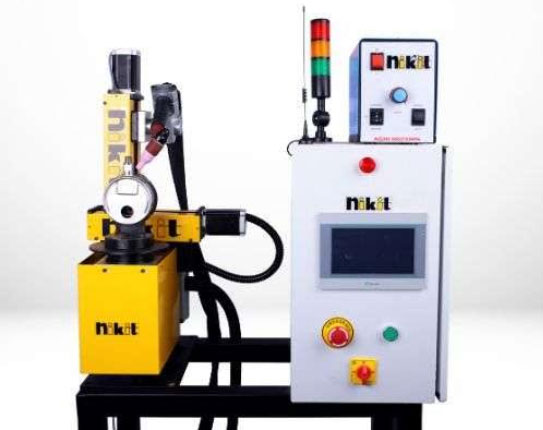Circular Welder
Vishes Global serves as a comprehensive provider of cutting-edge technology tailored for different industries, offering solutions for cleaning, passivation and corrosion challenges across various grades of stainless steel and high-performance alloys.
We are an authorized channel partner of Nikit Engineers on a PAN India level. By providing, best quality services and contemporary assistance to our esteemed customers, we aspire to create a special place for ourselves in the industry.
Circular Welders

A Circular Welder is a specialized welding machine used for joining cylindrical or circular
components in various industries such as manufacturing, construction and fabrication. This type of welding equipment is specifically designed to perform circumferential welding on pipes, tubes, tanks, cylinders and other round structures with precision and efficiency. These type of machines utilize a rotating mechanism to move the welding torch around the circumference of the work piece, ensuring a continuous and uniform weld seam. The welding torch is mounted on a carriage or manipulator that travels along the circular path, applying heat and filler material to create a strong and durable weld joint. This automated welding process is ideal for achieving consistent weld quality and productivity in round component fabrication.
There are different types available namely Orbital Welders, Rotary Welding Systems and Circumferential Welding Machines. Orbital welders are commonly used for high precision welding applications while rotary welding systems are suitable for welding large diameter pipes and tanks. Circumferential welding machines can be manual, semi-automatic or fully automated, depending on the complexity of the welding operation and
the level of control required.
Features of Circular Welder:
• Rotation Mechanism: These type of tools typically feature a rotation mechanism
that allows the work piece to rotate continuously during the welding process.
• Welding Head: The welding head is the part of the machine that performs the
actual welding process. It usually consists of a welding torch which can be
manually or automatically controlled, depending on the type of welder.
• Clamping System: Such welders often include a clamping system to securely hold
the work piece in place during welding. This system ensures that the component
remains properly aligned throughout the welding process.
• Control Panel: Latest type of such instruments may feature a control panel with
user friendly interfaces for setting welding parameters such as voltage, current,
travel speed and rotation speed.
• Power Source: These sort of welders requires a power source to supply electrical
energy for the welding process. This power source can vary depending on the
specific welding application.
• Welding Process Compatibility: Circular welders may support various welding
processes and the choice of welding process depends on factors such as material
type, thickness and desired weld quality.
• Safety Features: Safety is a critical consideration in welding operations, and may
include features such as emergency stop buttons, protective enclosures and safety
interlocks to ensure operator safety during operation.
• Mobility: Depending on the application, some type of welders may be designed for
stationary use in a fabrication shop, while others may be portable for on-site
welding operations.
Benefits of Circular Welder in a nutshell
• Precision welding for consistent welds.
• Versatility with various materials like steel, aluminum etc.
• Efficiency by automating welding processes.
• Compliance with industry standards for weld quality.
• Waste reduction through precise parameter control.
• Enhanced safety features to minimize risks.
• Consistent weld quality for reliable performance.
• Adaptability to specific welding requirements.
• Cost effectiveness through long term savings.
Circular Welder Applications industries
• Pipeline Construction: These welders are crucial for welding pipes efficiently, ensuring secure connections in pipelines.
• Pressure Vessel Manufacturing: These machines play a vital role in fabricating pressure vessels, meeting stringent safety standards.
• Tank Fabrication: These machines are used to weld cylindrical tanks, maintaining leak-proof seals for storage of liquids or gases.
• Structural Steel Assemblies: In construction and manufacturing, these tools weld steel components to create sturdy structures like buildings and bridges.
• Aerospace Industry: These equipment are employed in fabricating critical components for aircraft such as fuel tanks.
• Automotive Sector: They contribute to the production of automotive parts including exhaust systems, ensuring durability.
• Machinery Construction: These tools are used in manufacturing machinery parts where welded joints must withstand high stress.
• Versatile Manufacturing: Their adaptability allows for customization to meet specific requirements across various industries, facilitating efficient production.

